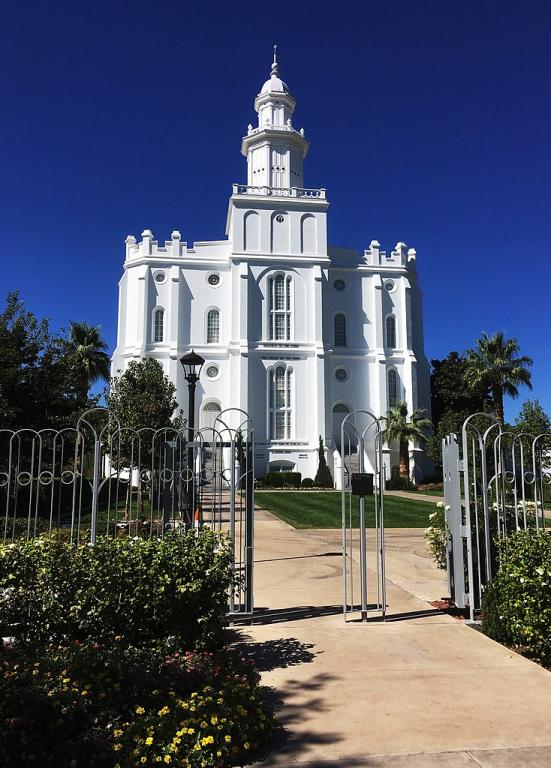
(Wikimedia Commons public domain photograph)
On Saturday morning, sitting with my wife and one of her friends in the celestial room of the St. George Utah Temple, I found myself watching a rather large group of people there. Like us clad in white, they were obviously family and friends of a young woman who had come through the temple that morning for the very first time. As she and they entered the room, there were hugs and kisses and tears of joy. It was a visibly happy occasion, though (as is expected in the temple) a serenely quiet one.
I began to reflect that this is how it is when a newly-deceased person emerges through the veil: Family and friends are there, and an extraordinarily joyous reunion ensues.
The words of a hymn that I seldom if ever heard as a young man but that the younger Dan Peterson probably would have regarded as corny and sentimental have come to mean a great deal to me. (More and more of those whom I have loved and who have influenced me are now on the other side of that veil.) Joseph L. Townsend (1849-1942) wrote the lyrics to the hymn:
Oh, what songs of the heart
We shall sing all the day,
When again we assemble at home,
When we meet ne’er to part
With the blest o’er the way,
There no more from our loved ones to roam!
When we meet ne’er to part,
Oh, what songs of the heart
We shall sing in our beautiful home.
Tho our rapture and bliss
There’s no song can express,
We will shout, we will sing o’er and o’er,
As we greet with a kiss,
And with joy we caress
All our loved ones that passed on before;
As we greet with a kiss,
In our rapture and bliss,
All our loved ones that passed on before.
Oh, the visions we’ll see
In that home of the blest,
There’s no word, there’s no thought can impart,
But our rapture will be
All the soul can attest,
In the heavenly songs of the heart;
But our rapture will be
In the vision we’ll see
Best expressed in the songs of the heart.
Oh, what songs we’ll employ!
Oh, what welcome we’ll hear!
While our transports of love are complete,
As the heart swells with joy
In embraces most dear
When our heavenly parents we meet!
As the heart swells with joy,
Oh, what songs we’ll employ,
When our heavenly parents we meet!
Sitting there in the temple, I also recalled a passage from the writings of Elisabeth Kübler-Ross (1926-2004), the famous Swiss-American physician, psychiatrist, and author of, among many other things, the pioneering 1969 book On Death and Dying:
[P]eople will also be aware that it is impossible to die alone. This also includes someone who dies of thirst in a desert hundreds of miles from the next human being, or an astronaut missing the target and circling around in the universe until he dies of lack of oxygen. . . .
[D]ying patients become aware of the presence of beings surrounding them who guide and help them. This is the first reason you cannot die alone. Young children often refer to them as “their playmates.” The churches have called them guardian angels. Most researchers would call them “guides.” It is not important what label we give them. It is important that we know that from the moment of birth, beginning with the taking of the first breath, until the moment when we make the transition and end this physical existence, we are in the presence of these guides or guardian angels. They will wait for us and help us in the transition from life to life after death.
The second reason why we cannot die alone is that we will always be met by those who preceded us in death and whom we have loved. This could be a child we lost, perhaps decades earlier, or a grandmother, a father, a mother or another person who has been significant in our lives.
I was reminded especially, too, of the final stanza of this well-known hymn, written by John Henry Cardinal Newman (1801-1890):
-
Lead, kindly Light, amid th’encircling gloom;Lead thou me on!The night is dark, and I am far from home;Lead thou me on!Keep thou my feet; I do not ask to seeThe distant scene–one step enough for me.
-
I was not ever thus, nor pray’d that thouShouldst lead me on.I loved to choose and see my path; but now,Lead thou me on!I loved the garish day, and, spite of fears,Pride ruled my will. Remember not past years.
-
So long thy pow’r hath blest me, sure it stillWill lead me onO’er moor and fen, o’er crag and torrent, tillThe night is gone.And with the morn those angel faces smile,Which I have loved long since, and lost awhile!
Posted from St. George, Utah












